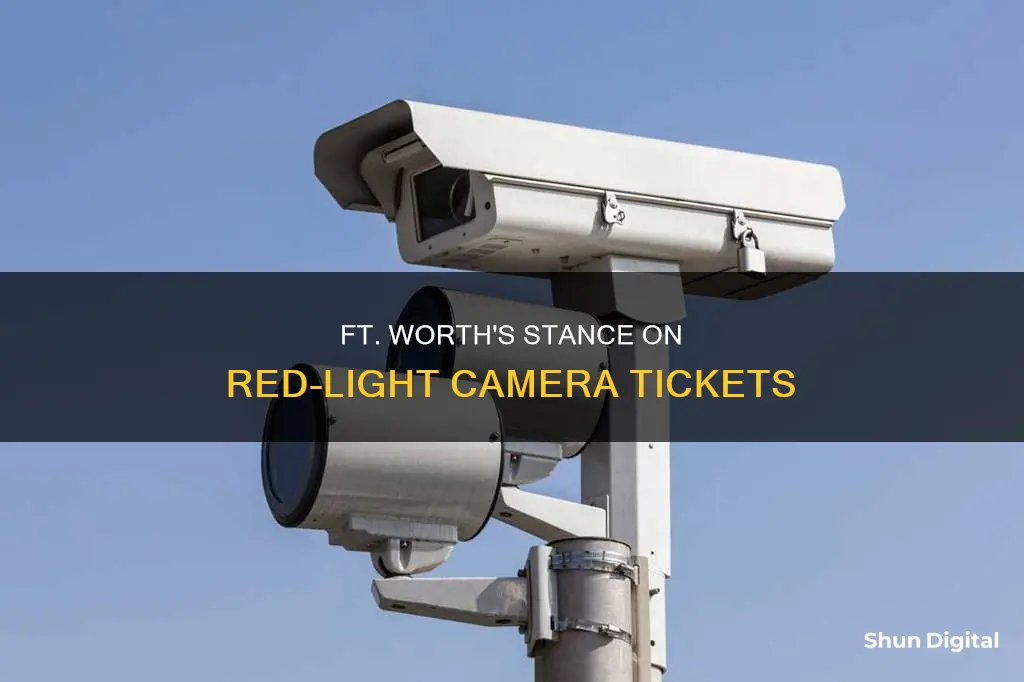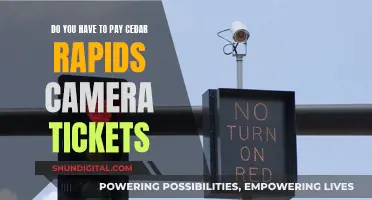
Fort Worth's stance on red-light camera tickets is that they are civil violations and not criminal convictions. The city implemented the Automated Red-Light Enforcement Program to reduce red-light running violations, crashes, and injury crashes. Tickets are $75 each, with a $25 late fee if unpaid within 45 days. While these tickets don't show up on driving records, affect insurance rates, or impact credit scores, they can prevent vehicle registration renewals until the fines are paid.
| Characteristics | Values |
|---|---|
| Reason for implementation | Reduce red-light running violations, red-light crashes, and red-light injury crashes |
| Who administers the program | The City of Fort Worth |
| Who provides equipment and process support | American Traffic Solutions Inc. (ATS) |
| How does an intersection safety camera work | Captures image from the rear approach showing the scene of the violation, including the back of the violating vehicle in front of the stop line |
| Number of cameras | 43 |
| Camera locations | E. Long Ave. at Deen Rd., Eastchase Pkwy. at Meadowbrook Blvd., N.W. 25th St. at Clinton Ave., etc. |
| Violation | Vehicle facing a steady red signal and crossing the stop line |
| Penalty | $75 for each violation |
| Late fee | $25 |
| Payment options | Online, mail, phone, in-person |
| Administrative hearing | Opportunity to appear before a city-appointed hearing officer and discuss the circumstances surrounding the notice of violation |
| Scofflaw hold | If violation fees remain unpaid, a scofflaw hold will be placed on the vehicle's registration until all delinquent fees are paid |
What You'll Learn
- Fort Worth's red-light camera program aims to reduce crashes and injuries
- Tickets are civil violations and don't impact insurance rates or driving records
- Fort Worth sent out 231,319 red-light camera tickets in one year, with over half unpaid
- Texas banned red-light cameras in 2019, but some cities still operate them
- Fort Worth's violation website states unpaid fines may impact vehicle registration

Fort Worth's red-light camera program aims to reduce crashes and injuries
Fort Worth's red-light camera program is designed to reduce crashes and injuries caused by red-light running. In 2011, Texas ranked second in red-light crash fatalities, with 714 deaths and 118,000 injuries occurring across the United States. According to the Insurance Institute for Highway Safety, red-light cameras can reduce violations by 40-50% and injury crashes by 25-30%.
The City of Fort Worth administers the program, contracting with American Traffic Solutions Inc. (ATS) for equipment and support. Cameras are installed at 43 intersections based on crash and violation statistics. The cameras capture images of vehicles violating the red signal, including the license plate, and a $75 fine is issued to the registered owner. These tickets are civil violations and do not affect driving records, insurance rates, or credit scores.
While these tickets cannot be ignored, as late fees will be applied, they also cannot be reported to credit bureaus. However, failure to pay can result in a vehicle registration hold until all delinquent fees are paid. Despite this, the Tarrant County tax assessor-collector has stated they will not block vehicle registrations due to unpaid fines.
The red-light camera program in Fort Worth aims to improve road safety and reduce the number of crashes and injuries caused by red-light running. While the tickets issued may be a nuisance to some, the overall goal is to create a safer environment for drivers and pedestrians alike.
Unlocking Galaxy S7 Camera Modes: Upgrading Your Photography
You may want to see also

Tickets are civil violations and don't impact insurance rates or driving records
Red-light camera tickets in Fort Worth, Texas, are considered civil violations and do not impact insurance rates or driving records. This means that these tickets are not criminal penalties and are instead similar to a parking ticket. While you may receive a $75 fine for running a red light, this will not be reported to a credit bureau and will therefore not affect your credit record.
However, it is important to note that some Texas counties, such as Dallas, will flag motorists with unpaid red-light tickets and block their vehicle registrations until the fines are paid. In Tarrant County, where Fort Worth is located, online vehicle registration may be blocked if there are unpaid red-light tickets. However, as stated by the Tarrant County Tax Assessor-Collector, individuals with flagged accounts can still renew their registration in person at any of the eight Tarrant tax assessor collector offices.
While these tickets do not impact insurance rates or driving records, individuals who receive them may still feel pressured to pay the fine to avoid further penalties or late fees. It is worth considering the potential consequences of not paying a red-light camera ticket in Fort Worth and making an informed decision accordingly.
Fight Iowa Speeding Tickets: Your Camera, Your Defense
You may want to see also

Fort Worth sent out 231,319 red-light camera tickets in one year, with over half unpaid
Fort Worth's stance on red-light camera tickets is that they are a necessary tool to improve road safety and reduce accidents. The city has implemented an Automated Red-Light Enforcement Program with the stated goal of reducing red-light running violations, crashes, and injury crashes. Texas ranked second in red-light crash fatalities in 2011, and an Institute review of international red-light camera studies found that cameras lower red-light violations by 40-50% and reduce injury crashes by 25-30%.
However, there is also a financial incentive for the city. In 2016, Fort Worth made $2.44 million from red-light camera tickets, and in fiscal year 2018, this figure rose to $8.3 million, of which Fort Worth kept $3.4 million after expenses and fees. While the city manager, David Cooke, maintains that the cameras are not designed to be a money-maker, the revenue generated is used for traffic safety improvements.
Despite the stated benefits of the program, there is significant opposition to the use of red-light cameras, with critics arguing that they invade privacy, rake in money for the city, and do not actually improve safety. One of the most vocal critics is Kelly Canon, who led a successful effort to have the cameras shut off in Arlington in 2015. Canon argues that the cameras are a "blatant constitutional violation" as they cannot prove who was driving the car at the time of the infraction and go against the Fourth, Fifth, and Sixth Amendments. She and her supporters plan to gather signatures on petitions to persuade the Fort Worth City Council to put the issue to a vote in November 2018.
Adding to the controversy is the fact that, in Fort Worth, over half of the red-light camera tickets issued go unpaid. In the last fiscal year, 231,319 tickets were issued, but 124,477 of those were sent to collections for non-payment. This is because, in Texas, red-light camera tickets are civil violations rather than criminal, so they do not show up on driving records, impact insurance rates, or affect credit scores. While some counties, like Dallas, block vehicle registrations for those with unpaid tickets, Tarrant County, where Fort Worth is located, does not. However, late fees will be incurred for unpaid tickets, and they may eventually be turned over to a collection agency.
Charging the Lytro Camera: A Step-by-Step Guide
You may want to see also

Texas banned red-light cameras in 2019, but some cities still operate them
Texas banned the use of red-light cameras in 2019, but some cities still operate them. So, what is Fort Worth's stance on red-light camera tickets?
In June 2019, Texas prohibited the use of red-light cameras, or photographic traffic signal enforcement systems, across the state. The bill was signed into law by Governor Greg Abbott, who announced the news on Twitter. This law prevents local authorities from installing or operating these systems and prohibits the use of evidence from them.
However, there is an exception to this rule. Cities with existing contracts with third-party installers are allowed to continue operating their red-light camera systems until the expiration of their contracts. This means that some Texas drivers may still receive tickets from red-light cameras in certain cities.
Leon Valley, for example, is the last city in Texas to use red-light cameras. This is because they signed a contract to keep the cameras up until 2039. Other cities, like Humble, Amarillo, and Balcones Heights, also continued to operate their cameras due to existing contracts.
While Fort Worth does not appear to be one of the cities with existing red-light cameras, it is important to note that the presence of these cameras does not change the rules of the road. Running a red light is still illegal, and drivers can still be pulled over and ticketed by police officers for this offence.
Sharpening Images: Adobe Camera Raw's Powerful Tools
You may want to see also

Fort Worth's violation website states unpaid fines may impact vehicle registration
Fort Worth's stance on red-light camera tickets is clear: they are a civil violation, not a criminal one, and they come with a $75 fine. While these tickets won't impact your insurance rates or credit record, ignoring them can have consequences.
The City of Fort Worth's website, Violationinfo, states that unpaid fines may impact vehicle registration. If you don't pay your red-light camera ticket within 45 days, a $25 late fee will be added to your bill. After 90 days, the city will send your violation to the state, requesting that your vehicle registration be put on hold until the fine is paid. This is known as the "scofflaw process."
To remove the hold on your vehicle registration, you must pay all delinquent red-light camera fees in full. Once you've done this, the City of Fort Worth will issue a Registration Release Letter, which you can present to your local tax assessor to renew your vehicle registration. However, you won't be able to renew your registration online; you'll have to go in person.
It's important to note that the scofflaw process only applies if the county you reside in participates. For example, Tarrant County, where Fort Worth is located, does not block vehicle registration for unpaid red-light camera fines. However, this could change in the future, as it depends on the decision of the county's tax assessor-collector.
The Evolution of Cameras: From First Invention to Now
You may want to see also
Frequently asked questions
The fine for red-light camera tickets in Fort Worth is $75.
Red-light camera tickets are considered civil violations and not criminal convictions. Not paying your ticket will not result in a criminal record, affect your insurance rates, or show up on your driving record. However, failure to pay may result in late fees and could eventually lead to a hold on your vehicle registration.
Ignoring a red-light camera ticket in Fort Worth can result in a $25 late fee. If the ticket remains unpaid, it may be sent to a collection agency, and a hold may be placed on your vehicle registration until all delinquent fees are paid.







